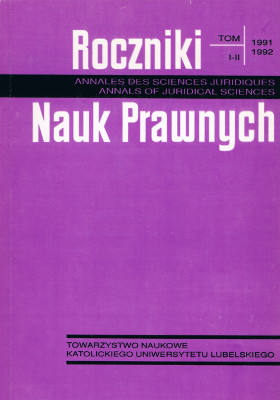Refleksje nad modelem relacji między państwem i kościołem w III Rzeczypospolitej
Abstrakt
At the stage of the transformations of the political system, which have been taken place in Poland since 1989, there is a debate on the type of the model of relation between the State and the Church in democratic Poland. Various opinions which have already been put forward should be grouped in two opposite standpoints.
Those who favour the first standpoint postulate a change in legal regulations, which were imposed by the communist authorities in order to build an atheistic State. They justify their standpoint by adhering to the principle of respecting moral values by the democratic State.
The proponents of the second standpoint, however, favour the preservation of the hitherto legal regulations, and particularly preservetion of the principle of „separation of Church and State” in the Constitution. They justify their standpoint by adhering to the assumptions taken from the ideology of radical liberalism. They raise an objection to the proponents of the first standpoint, namely that the latter want to impose a religious character on the contemporary Polish State. They introduce themselves as defendants of the lay State, neutral towards the system of moral values, and particularly Christian values.
In order to clarify this controversy the author has carried out an analysis of the folowing questions:
1.the conception of the religious and lay State as well as their substantiations in the history of Polish statehood;
2.the conception of a State neutral towards moral value;
3.a requirement to respect moral values, and particularly Christian values, on the part of the democratic State;
4.postulated principles of mutual relations between State and Church, which should be written in the Constitution of III Polish Republic.
Copyright (c) 1992 Roczniki Nauk Prawnych

Utwór dostępny jest na licencji Creative Commons Uznanie autorstwa – Użycie niekomercyjne – Bez utworów zależnych 4.0 Międzynarodowe.


